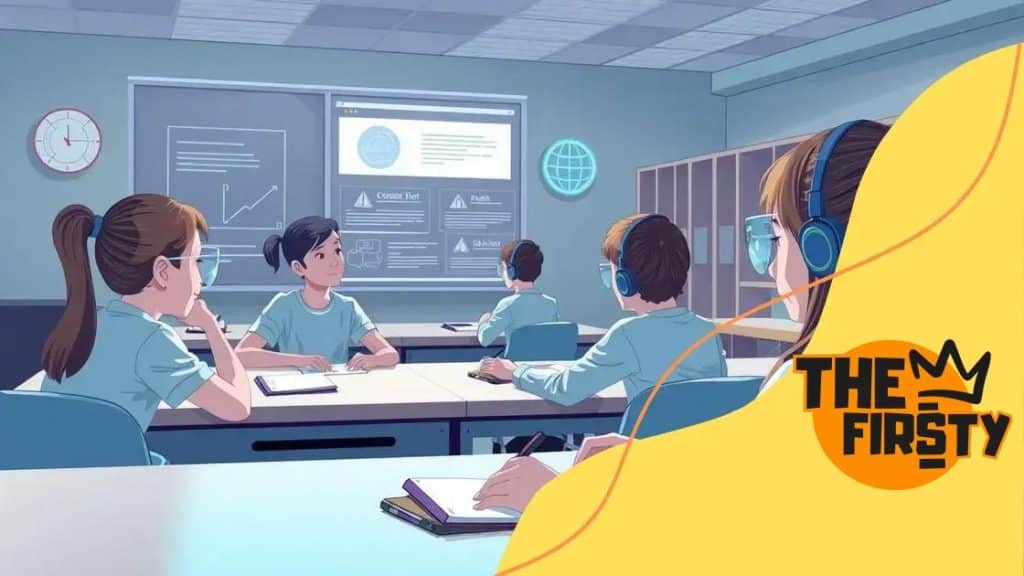How AI is revolutionizing student assessments

Anúncios
AI is revolutionizing student assessments by personalizing evaluations, providing immediate feedback, and minimizing biases, all while addressing challenges such as data privacy and technical limitations.
How AI is revolutionizing student assessments opens up exciting possibilities for education. Imagine a world where assessments are more personalized, fair, and efficient. How would that change the learning experience for students?
Anúncios
The role of AI in evaluating student performance
The role of AI in evaluating student performance is increasingly important in today’s educational landscape. This technology supports teachers and students alike, making assessments fairer and more effective.
AI helps in analyzing test results swiftly, allowing educators to understand individual student needs better. With this technology, it’s possible to deliver personalized feedback that can guide students on their learning journey.
Benefits of AI in Assessments
When integrating AI in evaluations, several advantages emerge:
Anúncios
- Increased efficiency in grading
- Personalized learning experiences
- Data-driven insights for teachers
- Identification of learning gaps quickly
Moreover, teachers can focus more on instruction rather than paperwork. By utilizing AI, they can spend more time engaging with students directly. This shift in focus can significantly enhance the learning environment.
How AI Enhances Fairness
Another crucial aspect is fairness in assessments. Traditional tests may be influenced by various biases. However, AI can help minimize these biases by evaluating student performance based on data rather than subjective measures.
For instance, algorithms can analyze diverse responses and provide equitable evaluations that reflect true performance. As a result, students get a chance to shine based on their capabilities, not on the type of questions they face or their background.
As AI continues to evolve, its role in education will likely grow. Students will benefit from more tailored learning experiences, and educators will receive the tools they need to help all students succeed.
Enhancing personalization in assessments with AI
Enhancing personalization in assessments with AI is a key development for modern education. With this technology, assessments can adapt to individual learning styles, making learning more engaging and effective.
AI analyzes how each student learns best. It collects data on their responses to questions, engagement levels, and progress over time. This information allows teachers to tailor assessments that fit each learner’s unique needs.
Benefits of Personalized Assessments
There are numerous benefits to personalizing assessments:
- Improved student engagement
- Targeted feedback on strengths and weaknesses
- Increased motivation through relevant questions
- Better preparation for future learning
When students see questions that reflect their interests or strengths, they are more likely to be engaged. This boost in motivation can lead to better performance and understanding. Instead of a one-size-fits-all approach, personalized assessments create a more inclusive learning environment.
How AI Adapts Assessments
Each student’s journey is unique, and AI recognizes this. By assessing individual performance, it can adjust the difficulty of questions or provide alternative formats that are more suitable for specific learners.
This means that students who struggle with certain concepts can receive support through additional practice. Meanwhile, those who excel can face more challenging materials to deepen their understanding. With AI, the assessment process becomes fluid and responsive to student needs, thus promoting continuous growth.
As educators embrace these technologies, they open doors to richer, more personalized learning experiences for their students. Enhancing assessments in this way can transform the learning journey, allowing every student to thrive.
Harnessing data analytics for improved feedback

Harnessing data analytics for improved feedback is essential in modern education. With the rise of AI tools, educators can analyze student performance in real-time and provide specific insights.
Data analytics looks at various factors, such as test scores, assignment completion rates, and even participation levels. By understanding these metrics, teachers can give more meaningful feedback that helps students learn and grow.
Benefits of Data-Driven Feedback
Data-driven feedback offers several advantages:
- Targeted support for struggling students
- Identification of common knowledge gaps
- Enhanced engagement based on performance trends
- Improved teaching strategies informed by data
This method of education focuses on the student. When teachers have concrete data, they can tailor their support to meet each individual’s needs. For example, if many students struggle with a specific topic, teachers can adjust their lessons to address these challenges.
How Data Analytics Works
By integrating AI and data analytics into the classroom, the process becomes more efficient. Tools can analyze vast amounts of data quickly and present findings in an easy-to-understand format. This makes it simpler for teachers to track progress and adjust their teaching methods accordingly.
Moreover, feedback can become much faster. Instead of waiting weeks for a test to be graded, AI can provide instant results, allowing students to learn from their mistakes right away. This timely feedback can significantly improve their understanding and retention of information.
As educators continue to harness data analytics, the feedback process will evolve. With every advancement in technology, the focus remains on enhancing student learning and success.
AI and the future of standardized testing
AI and the future of standardized testing is an exciting topic. As the educational landscape evolves, AI offers innovative solutions to improve traditional testing methods.
Standardized tests have long been a staple in assessing student performance. However, they often fail to capture the full range of student abilities. With AI, we can create more dynamic and accurate evaluations that reflect individual learning styles.
Transforming Testing Approaches
AI can change how standardized tests are designed and administered:
- Adaptive testing that adjusts difficulty based on student responses
- Real-time analytics to track student progress
- Personalized feedback to help students improve
- Reduction of test anxiety through flexibility and accessibility
By using AI, we can offer assessments tailored to each learner. This approach allows for a more equitable evaluation process where every student gets a fair chance to demonstrate their knowledge.
Benefits of AI in Assessments
Using AI in standardized testing provides many benefits. It promotes a deeper understanding of subjects by evaluating how students think and approach problems. Instead of just measuring whether they know the right answer, AI can analyze their thought processes, providing richer insights.
Furthermore, with automated grading, feedback can be immediate. This timely response helps students learn from their mistakes quickly. With AI, teachers can also receive data on how their class is performing overall, making it easier to adjust lesson plans as needed.
Looking ahead, the incorporation of AI into standardized testing could lead to a significant shift in education. It opens the door for more engaging and effective assessments that benefit both students and educators.
Challenges and considerations in AI-driven assessments
Challenges and considerations in AI-driven assessments are important topics to explore. While AI brings many benefits to education, it also presents some hurdles that educators must navigate.
One significant challenge is data privacy. With the increasing use of technology, student data is being collected and analyzed. Schools must ensure that this information is protected and used appropriately. Balancing the benefits of AI with the need to keep student data safe is essential.
Technical Limitations
Another consideration is the technical limitations of AI. Not all systems are equally reliable. Sometimes, AI may misinterpret data or provide biased results due to flawed algorithms.
In addition, not every school has access to the necessary technology or the budget for advanced AI systems. This divide can create inequalities in how students are assessed.
Training and Implementation
Proper training for teachers is crucial as well. Educators need to understand how to effectively use AI in assessments. If they lack the skills or knowledge, the technology may not be utilized to its full potential.
Moreover, constant monitoring and evaluation of AI systems are needed. Regular updates can help address issues and improve efficacy. Schools should be prepared to invest time and resources to adapt to new tools and techniques.
In summary, while AI offers exciting possibilities for assessments, the challenges it brings must not be overlooked. Addressing these issues will be key to successfully integrating AI into education and ensuring fair assessments for all students.
FAQ – Frequently Asked Questions about AI in Student Assessments
How does AI personalize student assessments?
AI analyzes individual student data to tailor assessments that fit their unique learning styles, enhancing engagement and understanding.
What are the privacy concerns with AI in education?
As AI systems collect and analyze student data, it is crucial to protect this information to ensure it is used responsibly and ethically.
What benefits does AI provide in standardized testing?
AI can create adaptive tests that adjust difficulty based on student responses, providing a more accurate measure of student ability.
How can teachers effectively implement AI tools?
Teachers need proper training to understand and use AI tools effectively, ensuring they can leverage the technology to enhance learning.





